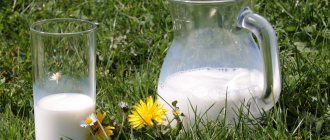GastrituNet.ru » Stomach diseases » Gastritis » Treatment » Diet
Fermented milk products are healthy foods for both healthy people and those with gastrointestinal diseases. But not all fermented milk products are good for an inflamed stomach. How to properly consume products made from sour milk, how much kefir is digested in the stomach, how to choose the right products - we will tell you in our article.
- 1 How long does kefir digest in the human stomach?
- 2 Benefits and harms of fermented milk products for the stomach
- 3 Consumption of kefir for a healthy stomach and for the prevention of diseases
- 4 Consumption of kefir during exacerbation of stomach diseases
- 5 Consumption of kefir during remission
- 6 Features of the lactic acid diet for gastritis and ulcers
- 7 Recipes for dietary dishes with kefir
- 8 Useful video
- 9 Advice from a gastroenterologist
The benefits and harms of fermented milk products for the stomach
Fermented milk products are rich in: Ca, vitamins D, B, A, E, essential microelements, beneficial bacteria. For the stomach, kefir is a valuable lactic acid drink that promotes the proper functioning of the entire body.
Beneficial properties of fermented milk foods:
- rapid recovery after heavy physical activity or illness;
- promotes an increase in red blood cells in the blood;
- a good replacement for animal proteins, which are difficult to digest by a damaged digestive tract;
- has a positive effect on the secretory function of gastric juice;
- normalizes digestive functions.
At the same time, fermented milk and its derivatives can negatively affect the diseased organ.
Negative influence:
- unlimited consumption of fermented milk products can cause indigestion and diarrhea;
- pain in the stomach and intestines, especially when drinking kefir on an empty stomach;
- if food is stored improperly, its consumption can cause poisoning;
- if fermented milk products are consumed after the indicated expiration date, it may cause intestinal upset (constipation, diarrhea).
When digestion is impaired, you should immediately stop taking fermented milk products until the symptoms resolve and the cause is determined.
How long does it take to digest kefir?
Kefir is a fermented drink full of probiotics and other beneficial ingredients.
It contains a significant amount of bacteria and yeast, which have a beneficial effect on the intestinal flora. For those who are on a diet, it is especially important how long this product takes to digest. Kefir contains a small amount of alcohol, so it is not recommended to be consumed in large quantities by children, those with epilepsy, and even drivers.
The drink is prepared using special fungi. Homemade kefir contains bacteria that are beneficial for the stomach, such as:
- streptococci;
- milk stick;
- acetic bacterium.
The drink has a rich composition, which contains not only minerals and vitamins, but also numerous acids. Proteins, fats and carbohydrates are balanced in kefir, and the drink itself is classified based on the percentage of fat content. On the shelves of modern stores you can find a 1% product, as well as kefir with a fat percentage of 2.5 and 3.25.
If we talk about nutritional value, the drink contains the following components:
- ash;
- water;
- cholesterol;
- monosaccharides and disaccharides.
100 g of product contains 12 g of protein, 23 g of fat, and 16 g of carbohydrates. Thus, the total calorie content is only 53 kcal.
Not all people are accustomed to consuming this product every day, but in fact it is very beneficial for the body, including digestion. Starting to drink it regularly, you need to gradually increase the dose: first, 100 ml per day. It is possible that the body will quickly feel the effect of the drink - it depends on how sensitive the person’s intestines are.
Side effects:
- spasms;
- constipation;
- bloating;
- flatulence.
If there is no experience of consuming similar foods, the negative effects will probably be more obvious at first, but they will not last long. There is no need to stop, because soon everything will pass.
As a last resort, if you cannot overcome such symptoms, then you should stop drinking kefir and get medical advice. It is possible that a person has an individual intolerance to the product.
Most often, the body adapts to the daily consumption of the drink. It is recommended to drink about 200-300 ml of kefir per day (1 glass). If it is too thick, then it can be diluted with water in a proportion of 350 ml per 1.5 cups of liquid.
Improvements from drinking this drink can be felt in the near future.
It is best to drink kefir continuously for 3 months to feel the desired effect on the body.
The benefits of kefir are as follows:
- it is rich in vitamin B;
- kefir contains folic acid;
- the product contains easily digestible proteins;
- full of bacteria that aid digestion;
- contains antimicrobial strains of lactobacilli;
- increases immunity;
- helps balance intestinal microflora disturbed by antibiotics;
- treats inflammatory diseases of the stomach;
- helps fight allergies;
- can be used if you are lactose intolerant;
- lowers blood pressure;
- helps increase bone density;
- can help fight anemia;
- used as prophylaxis in the fight against malignant tumors.
Kefir intake may need to be limited if a person experiences serious side effects. As a rule, the drink itself does not cause deterioration in health, but it can provoke some diseases.
Kefir should not be consumed by those who must consume less protein, probiotics, acidic foods and other similar components. If discomfort occurs, you should consult a doctor.
Each person has his own daily intake of kefir - and it is worth sticking to it in order to feel better. Some people are able to drink more than one glass a day, and it is easily digested, but for others this is too much, so it is better to dilute the drink with water. As a rule, the discomfort goes away within two weeks.
One of the main advantages of kefir is the speed at which it is digested by the body. The body will need about 30-40 minutes per glass of drink. All its components are quickly absorbed, but at the same time the decay time of the elements included in kefir is reduced. After some time, food begins to be digested 40% faster, thereby saving the necessary energy.
All this became possible thanks to the large amount of carbon dioxide contained in the drink, because it is this that can irritate the walls of the stomach so that it begins to produce more juice.
For the beneficial properties of the drink to be evident, it must be consumed fresh. Only such a drink cannot cause harm, but will help solve many problems of the stomach and intestines. It is especially useful for children and the elderly to include kefir in their diet, as it has a positive effect on the pancreas and liver.
It is best when the product is made independently at home from whole milk, since it contains the maximum amount of essential lactobacilli and vitamins. If you purchase a store-bought product, you should pay special attention to the expiration date. Kefir will only be beneficial if it is fresh.
You will learn more about the benefits of kefir in the following video.
Source: https://eda-land.ru/kefir/skolko-perevarivaetsya/
Consumption of kefir for a healthy stomach and for the prevention of diseases
For a healthy gastrointestinal tract, you need to drink at least a glass of this valuable drink every day. It has a number of positive effects on a healthy body:
- prevents the proliferation of harmful infectious bacteria;
- stimulates intestinal motility;
- normalizes digestion;
- promotes the removal of waste and toxins from the intestines;
- improves the microflora of the organ mucosa;
- helps strengthen the heart muscle and vascular system;
- accelerates the elimination of bad cholesterol.
Daily consumption of kefir products has a beneficial effect on the replenishment of nutrients in the body, normalizes overall health and prevents the occurrence of gastritis and gastrointestinal ulcers.
Consumption of kefir during exacerbation of stomach diseases
If stomach diseases worsen, you should stop taking fermented milk. Drinking kefir with increased acidity of an inflamed stomach is prohibited. Ignoring pain can lead to pathological complications, followed by hospitalization. An acidic drink will irritate and corrode the mucous membranes of the organ, leading to even greater pain and the development of open ulcers.
When eliminating negative symptoms, sometimes a fasting day (fasting) is enough, but in any case, consultation with a doctor is necessary.
It is especially not recommended to drink kefir if you have an erosive disease of the stomach, in which microcracks and ulcers appear on the walls of the mucous membrane.
Consumption of kefir during remission
During the subsidence of the disease, drinking kefir drink is useful, but no more than a glass at a time a couple of times a day.
General recommendations for taking kefir products:
- Do not exceed the permissible volumes of alcohol consumed.
- Use only fresh products.
- The fat content of kefir should be no more than 3%.
- The temperature of the drink should be at room temperature.
- Kefir prepared at home using natural cow's milk is healthier.
How long does it take to digest?
The digestion time for kefir is 30-40 minutes. The product is not only absorbed quickly, but also reduces the duration of food metabolism. The digestion process is accelerated by 30-40%. This allows the body to conserve energy that could have been spent on digesting food. Rapid absorption occurs due to the carbon dioxide content. It irritates the walls of the stomach, causing the production of gastric juice.
The storage period for kefir does not exceed 5-7 days. Only fresh fermented milk product is considered to be of high quality and will not cause harm. Doctors recommend drinking kefir to prevent diseases of the gastrointestinal tract, liver and pancreas diseases. People with excess weight problems should include it in their diet. It is also appropriate to prescribe a drink after a course of antibiotics to normalize the intestinal microflora, since medications kill not only pathogenic organisms, but also substances necessary for normal digestion.
Features of the lactic acid diet for gastritis and ulcers
A healthy fermented milk drink must meet certain requirements for it. The correct choice of kefir products guarantees a positive effect when consumed.
Criteria for choosing a kefir drink:
- The shelf life of the drink should not be more than 5-7 days;
- the contents of the package must have a uniform consistency;
- When purchasing a product, make sure that the container is not damaged;
- It is unacceptable to purchase goods with exfoliated whey;
- Drink no more than two glasses of fermented milk product during the day;
- Take drinks only at room temperature.
If, after drinking kefir, your stomach begins to hurt, it is advisable to go to see a doctor to adjust your diet.
Recipes for dietary dishes with kefir
Plum-honey kefir drink
Ingredients: liter of fermented milk drink, 200 g plums or prunes, 50 g. honey
Cooking technology:
- remove pits from prunes;
- season the fruits with honey, leave for a couple of hours;
- add a couple of teaspoons of the prepared sweet mixture to the drink and drink;
- Serve kefir at room temperature.
Homemade low-fat cottage cheese
Ingredients: milk 2.5% fat, 50 ml. kefir
Cooking technology:
- Combine boiled and cooled milk with kefir, stir thoroughly;
- leave the mixture in the room for 6-9 hours;
- pour the contents into a colander lined with gauze;
- the resulting cottage cheese can be seasoned with raisins, dried apricots, honey, to taste.
Kefir smoothie with zucchini
Ingredients: 200 gr. zucchini without peel, a glass of low-fat fermented milk drink, a teaspoon of honey.
Cooking technology:
- rinse the zucchini, cut into cubes;
- pour kefir liquid into a deep container (liter jar), add honey and chopped vegetables;
- blend with a blender for at least a minute
- Pour the smoothie into a glass and put in a straw.
Homemade cheese
Ingredients: half a liter of kefir, one and a half liters of milk, 2 pinches of salt.
Cooking technology:
- bring the milk to a boil, cool;
- add salt to milk;
- Combine milk and kefir in a saucepan, simmer over low heat for a couple of minutes, stirring constantly;
- pour the resulting brew into a colander lined with gauze and let drain;
- crumple the cottage cheese and put under a press for 2 to 10 hours;
- The longer the cheese is under pressure, the harder it will be.
Creamy soft cheese
Ingredients: kefir or fermented baked milk in any quantity. One liter of product yields approximately 200 grams of cheese.
Cooking technology:
- freeze the fermented milk drink in a container that fits under a colander;
- remove the product from the freezer and place in a colander lined with three layers of thick gauze;
- wait the required amount of time until the product is completely defrosted;
- squeeze out the mass, add salt, sugar, herbs to taste.
Flax drink with sour milk
Ingredients: 200 ml. fermented milk, 2 teaspoons ground flax seed.
Cooking technology:
- Mix sour milk at room temperature with flax seeds crushed in a blender, immediately before drinking the drink.
You should drink the prepared mixture before going to bed. It cleanses the body well, gently removing stagnant waste products of the body from the intestinal tract.
Kefir for the stomach: benefits, recipes for dietary dishes
Fermented milk products are healthy foods for both healthy people and those with gastrointestinal diseases. But not all fermented milk products are good for an inflamed stomach. How to properly consume products made from sour milk, how much kefir is digested in the stomach, how to choose the right products - we will tell you in our article.
How long does it take for kefir to be digested in the human stomach?
The speed of digestion of foods varies. Kefir is a healthy, easily digestible product, therefore, with normal functioning of the gastrointestinal tract, absorption will take about an hour. The speed of food processing in the gastric tract depends on the acidity of gastric juice, the fat content of food, and the amount eaten or drunk.
The benefits and harms of fermented milk products for the stomach
Beneficial properties of fermented milk foods:
- rapid recovery after heavy physical activity or illness;
- promotes an increase in red blood cells in the blood;
- a good replacement for animal proteins, which are difficult to digest by a damaged digestive tract;
- has a positive effect on the secretory function of gastric juice;
- normalizes digestive functions.
At the same time, fermented milk and its derivatives can negatively affect the diseased organ.
Negative influence:
- unlimited consumption of fermented milk products can cause indigestion and diarrhea;
- pain in the stomach and intestines, especially when drinking kefir on an empty stomach;
- if food is stored improperly, its consumption can cause poisoning;
- if fermented milk products are consumed after the indicated expiration date, it may cause intestinal upset (constipation, diarrhea).
When digestion is impaired, you should immediately stop taking fermented milk products until the symptoms resolve and the cause is determined.
Consumption of kefir for a healthy stomach and for the prevention of diseases
For a healthy gastrointestinal tract, you need to drink at least a glass of this valuable drink every day. It has a number of positive effects on a healthy body:
- prevents the proliferation of harmful infectious bacteria;
- stimulates intestinal motility;
- normalizes digestion;
- promotes the removal of waste and toxins from the intestines;
- improves the microflora of the organ mucosa;
- helps strengthen the heart muscle and vascular system;
- accelerates the elimination of bad cholesterol.
Daily consumption of kefir products has a beneficial effect on the replenishment of nutrients in the body, normalizes overall health and prevents the occurrence of gastritis and gastrointestinal ulcers.
Consumption of kefir during exacerbation of stomach diseases
When eliminating negative symptoms, sometimes a fasting day (fasting) is enough, but in any case, consultation with a doctor is necessary.
It is especially not recommended to drink kefir if you have an erosive disease of the stomach, in which microcracks and ulcers appear on the walls of the mucous membrane.
Consumption of kefir during remission
During the subsidence of the disease, drinking kefir drink is useful, but no more than a glass at a time a couple of times a day.
General recommendations for taking kefir products:
- Do not exceed the permissible volumes of alcohol consumed.
- Use only fresh products.
- The fat content of kefir should be no more than 3%.
- The temperature of the drink should be at room temperature.
- Kefir prepared at home using natural cow's milk is healthier.
Features of the lactic acid diet for gastritis and ulcers
A healthy fermented milk drink must meet certain requirements for it. The correct choice of kefir products guarantees a positive effect when consumed.
Criteria for choosing a kefir drink:
- The shelf life of the drink should not be more than 5-7 days;
- the contents of the package must have a uniform consistency;
- When purchasing a product, make sure that the container is not damaged;
- It is unacceptable to purchase goods with exfoliated whey;
- Drink no more than two glasses of fermented milk product during the day;
- Take drinks only at room temperature.
Recipes for dietary dishes with kefir
Plum-honey kefir drink
Ingredients: liter of fermented milk drink, 200 g plums or prunes, 50 g. honey
Cooking technology:
- remove pits from prunes;
- season the fruits with honey, leave for a couple of hours;
- add a couple of teaspoons of the prepared sweet mixture to the drink and drink;
- Serve kefir at room temperature.
Homemade low-fat cottage cheese
Ingredients: milk 2.5% fat, 50 ml. kefir
Cooking technology:
- Combine boiled and cooled milk with kefir, stir thoroughly;
- leave the mixture in the room for 6-9 hours;
- pour the contents into a colander lined with gauze;
- the resulting cottage cheese can be seasoned with raisins, dried apricots, honey, to taste.
Kefir smoothie with zucchini
Ingredients: 200 gr. zucchini without peel, a glass of low-fat fermented milk drink, a teaspoon of honey.
Cooking technology:
- rinse the zucchini, cut into cubes;
- pour kefir liquid into a deep container (liter jar), add honey and chopped vegetables;
- blend with a blender for at least a minute
- Pour the smoothie into a glass and put in a straw.
Homemade cheese
Ingredients: half a liter of kefir, one and a half liters of milk, 2 pinches of salt.
Cooking technology:
- bring the milk to a boil, cool;
- add salt to milk;
- Combine milk and kefir in a saucepan, simmer over low heat for a couple of minutes, stirring constantly;
- pour the resulting brew into a colander lined with gauze and let drain;
- crumple the cottage cheese and put under a press for 2 to 10 hours;
- The longer the cheese is under pressure, the harder it will be.
Creamy soft cheese
Ingredients: kefir or fermented baked milk in any quantity. One liter of product yields approximately 200 grams of cheese.
Cooking technology:
- freeze the fermented milk drink in a container that fits under a colander;
- remove the product from the freezer and place in a colander lined with three layers of thick gauze;
- wait the required amount of time until the product is completely defrosted;
- squeeze out the mass, add salt, sugar, herbs to taste.
Flax drink with sour milk
Ingredients: 200 ml. fermented milk, 2 teaspoons ground flax seed.
Cooking technology:
- Mix sour milk at room temperature with flax seeds crushed in a blender, immediately before drinking the drink.
You should drink the prepared mixture before going to bed. It cleanses the body well, gently removing stagnant waste products of the body from the intestinal tract.
When it is useful to use kefir you can learn from this video.
Advice from a gastroenterologist
When asked whether you can drink kefir if you have a stomach ache, experts give a positive answer, but with some limitations, especially with regard to the patient’s diagnosis:
- It is recommended for all people to drink kefir products, but within the limits of what is permitted.
- It is not recommended to use kefir if you have a severe stomach upset.
- The main treatment of gastritis and gastrointestinal ulcers should include dietary nutrition.
- It is advisable not to drink the drink on an empty stomach.
- Any food intake should be limited to small portions, then many problems associated with gastrointestinal disease can be avoided.
- Do not use if the acidic environment of the inflamed organ is elevated.
- Children under 12 months are not recommended to eat kefir foods.
- Individual intolerance precludes acceptance of the product.
Regardless of the diagnosis, it is necessary to eat permitted foods and drink liquids in permitted quantities.
Source: https://GastrituNet.online/bolezni-zheludka/gastrit/lechenie-g/dieta/skolko-perevarivaetsya-kefir-v-zheludke.html
Advice from a gastroenterologist
When asked whether you can drink kefir if you have a stomach ache, experts give a positive answer, but with some limitations, especially with regard to the patient’s diagnosis:
- It is recommended for all people to drink kefir products, but within the limits of what is permitted.
- It is not recommended to use kefir if you have a severe stomach upset.
- The main treatment of gastritis and gastrointestinal ulcers should include dietary nutrition.
- It is advisable not to drink the drink on an empty stomach.
- Any food intake should be limited to small portions, then many problems associated with gastrointestinal disease can be avoided.
- Do not use if the acidic environment of the inflamed organ is elevated.
- Children under 12 months are not recommended to eat kefir foods.
- Individual intolerance precludes acceptance of the product.
Regardless of the diagnosis, it is necessary to eat permitted foods and drink liquids in permitted quantities.
Composition and calorie content
The fermented milk product contains a small amount of alcohol, which is why it is not recommended for use by young children, drivers and people suffering from epilepsy.
The drink is prepared using special kefir grains. The finished product contains a large number of beneficial bacteria: lactic acid bacteria, streptococci containing yeast, acetic acid bacteria and others. In addition, the drink contains:
- vitamins;
- minerals;
- organic acids;
- balanced amount of proteins, fats and carbohydrates.
Kefir is classified mainly by its fat content. Available on sale: low-fat product with fat content of 1%, 2.5% and 3.2%. Nutritional information includes: ash, mono- and disaccharides, saturated fatty acids, cholesterol and water. The calorie content of this fermented milk product can be calculated as follows:
| Category | Calorie content, kcal |
| Squirrels | 12 |
| Fats | 23 |
| Carbohydrates | 16 |
| General | 53 |










